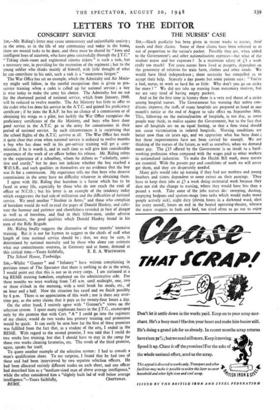" Gunner" and " Infantry " have written complaining in previous
issues of The Spectator that there is nothing to do in the army, I would point out that this is not so in every corps. I am stationed at a big REME training bastalion, employed on the administrative side. For three months we were working from 7.45 a.m, until midnight, one, two or three o'clock in the morning, with a total break for meals, etc., of an hour and a half. Now the situation has eased and we finish possibly by 8 p.m. There is no appreciation of this work ; nor is there any over- time pay, as the army claims that it pays us for twenty-four hours a day.
On the other hand, I entirely agree with " Gunner's " views on the selection system. I spent many unpleasant hours in the J.T.C., encouraged only by the promise that with Cert. " A " I could go into the regiment of my choice, would do two weeks less primary training and promotion would be quick. It can easily be seen how far the first of these promises was fulfilled from the fact that, as a student of the arts, I ended in the REME. With regard to the second promise, I was told that I could do two weeks less training, but that I should have to stay in the camp for those two weeks cleaning lavatories, etc. The result of the third promise, again, speaks for itself.
To quote another example of the selection system: I had to consult a man's qualification sheet. To my surprise, I found that he had two of these and had been interviewed by two separate selection officers. He had been allocated entirely different trades on each sheet, and one officer had described him as a "medium-sized man of above average intelligence," while the other considered him a "slightly built lad of well below average


































 Previous page
Previous page